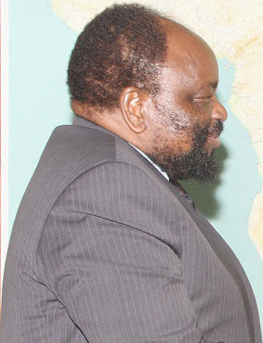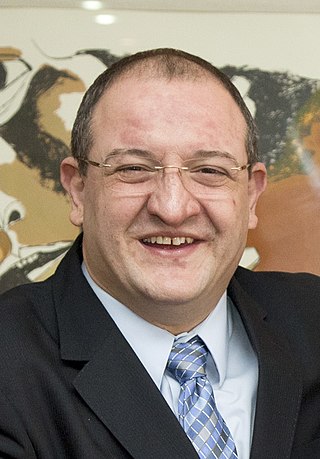
The Organization of American States is an international organization founded on 30 April 1948 to promote cooperation among its member states within the Americas. Headquartered in Washington, D.C., United States, the OAS is a "multilateral regional body focused on human rights, electoral oversight, social and economic development, and security in the Western Hemisphere", according to the Council on Foreign Relations. As of June 2023, 35 states in the Americas are OAS members. Since the 1990s, the organization has focused on election monitoring. Luis Almagro was inaugurated as OAS secretary general in 2015.

The United Nations General Assembly is one of the six principal organs of the United Nations (UN), serving as its main deliberative, policymaking, and representative organ. Currently in its 77th session, its powers, composition, functions, and procedures are set out in Chapter IV of the United Nations Charter. The UNGA is responsible for the UN budget, appointing the non-permanent members to the Security Council, appointing the UN secretary-general, receiving reports from other parts of the UN system, and making recommendations through resolutions. It also establishes numerous subsidiary organs to advance or assist in its broad mandate. The UNGA is the only UN organ where all member states have equal representation.

The University for Peace (UPEACE) is an international graduate-only university and intergovernmental organization. The university was established as a treaty organisation by the United Nations General Assembly in 1980.

The United Nations Mission for the Referendum in Western Sahara is the United Nations peacekeeping mission in Western Sahara, established in 1991 under United Nations Security Council Resolution 690 as part of the Settlement Plan, which had paved way for a cease-fire in the conflict between Morocco and the Polisario Front over the contested territory of Western Sahara.

The Rio Group (G-Rio) was a permanent association of political consultation of Latin America and Caribbean countries, created in Rio de Janeiro, Brazil on December 18, 1986 with the purpose of creating a better political relationship among the countries. It was succeeded in 2011 by the Community of Latin American and Caribbean States

The United Nations Assistance Mission in Afghanistan is a UN Special Political Mission tasked with assisting the people of Afghanistan.

Simbarashe Simbanenduku Mumbengegwi is a Zimbabwean politician and diplomat currently serving as Minister of State for Presidential Affairs and Monitoring Government Programmes. Previously he was acting Foreign Minister for a few days following the resignation of former President Robert Mugabe He had previously served as Zimbabwe's Minister of Foreign Affairs from 2005 to 2017. From October to November 2017, he was Minister of Macro-Economic Planning and Investment Promotion.
The United Nations Mission in Haiti (UNMIH) was a peacekeeping operation carried out by the United Nations between September 1993 and June 1996. The Mission was reestablished (MINUSTAH) in April 2004, after a rebellion took over most of Haiti and President Bertrand Aristide resigned. This mandate ended in 2017, replaced by United Nations Mission for Justice Support in Haiti (MINUJUSTH), which saw the end of UN peacekeepers in Haiti after its ending in 2019.
Brazil is a founding member of the United Nations and participates in all of its specialized agencies. Brazil is among the twenty top contributors to United Nations peacekeeping operations, and has participated in peacekeeping efforts in the Middle East, the former Belgian Congo, Cyprus, Mozambique, Angola, and more recently East Timor and Haiti. Brazil has been regularly elected as a non-permanent member to the Security Council since its first session in 1946 and is now among the most elected UN member states to the UNSC. Brazil was voted to become a member of the 15-country UN Security Council for a two-year term, in 2022-23.

New Zealand is a founding member of the United Nations, having taken part in the 1945 United Nations Conference on International Organization in San Francisco.

The Central American Integration System has been the economic and political organization of Central American states since 1 February 1993. On 13 December 1991, the ODECA countries signed the Protocol of Tegucigalpa, extending earlier cooperation for regional peace, political freedom, democracy and economic development. SICA's General Secretariat is in El Salvador.

Rebeca Grynspan Mayufis is a Costa Rican economist who has been serving as Secretary General of the United Nations Conference on Trade and Development (UNCTAD) since 13 September 2021.

Canada–Haiti relations are relations between Canada and the Republic of Haiti. They are the only independent French-speaking countries in the Americas. During the unsettled period from 1957 to 1990, Canada received many Haitian refugees, who now form a significant minority in Quebec. Canada participated in various international interventions in Haiti between 1994 and 2004, and continues to provide substantial aid to Haiti. Both nations are members of the Organisation internationale de la Francophonie, Organization of American States and the United Nations.
Anthony Banbury was appointed the President and Chief Executive Officer of the International Foundation for Electoral Systems (IFES) in 2018. He served as United Nations Assistant Secretary-General for Field Support until 5 February 2016. He resigned from this position, stating that the UN is in dire need of reform. Drawing on more than 20 years of experience with the UN, he criticized its sclerotic personnel system, a lack of accountability, insufficient impact and the UN's inability to deal with transgressions by its own staff.
Ambassador Nazareth Avendaño Incera is a career officer of the Costa Rican foreign service. She is currently the Director of the Worship Department of the Ministry Foreign Affairs and Worship of Costa Rica.
Emilia Castro de Barish was a Costa Rican diplomat. She was the first woman to be appointed a career Ambassador in the Costa Rican diplomatic service and, for many years, she was the dean of the foreign service.

Ambassador Luis Fernando Carrera Castro is a Guatemalan economist, political analyst and diplomat. He served as Permanent Representative of Guatemala to the United Nations during the presidency of Otto Perez Molina. Before that, he was the Minister for Foreign Affairs, during the same administration. He is a Guatemalan economist, specializing in fiscal policies, and also a political analyst. He obtained his bachelor's degree in economics from Universidad Nacional de Costa Rica in 1990. Then, he obtained an M. Phil. in Economics and Politics of Development, at Cambridge University in 1992.

The Embassy of Costa Rica in London is the diplomatic mission of Costa Rica in the United Kingdom. The mission was raised to the status of embassy in 1956, having previously been a legation.
Malaysia became the 82nd member of the United Nations on 17 September 1957. Malaysia has held a rotational non-permanent seat on the United Nations Security Council for four terms, and has participated in over 30 United Nations peacekeeping missions since October 1960.
Azerbaijan has been a member in the United Nations since March 2, 1992, after the UN General Assembly admitted Azerbaijan at its 46th session. The Permanent Mission of the Republic of Azerbaijan was opened in New York City in May 1992. On October 29, 1991, soon after gaining independence from the Soviet Union, Azerbaijan applied to the UN General Assembly for joining the organization. Azerbaijan was elected as a non-permanent member of the UN Security Council for the term of 2012–2013. Through the UN, Azerbaijan has reached out to the international community, especially Europe. Azerbaijan strengthened its relations with the UN by cooperating with UN agencies and bodies such as International Monetary Fund, the World Bank, the World Food Programme, and the financial institutions of the UN.











